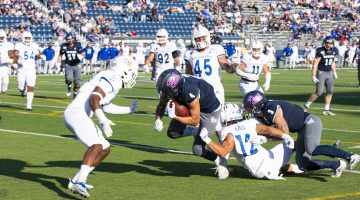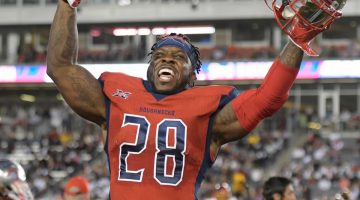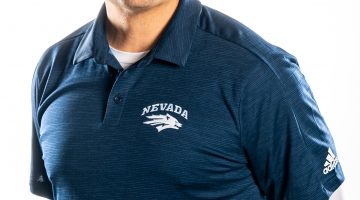
Photo courtesy of Andrew McGregor/U.S Sport History
Nevada football players raise their fists as the national anthem plays at last Saturday’s game at Ross-Ade Stadium. The players’ protest comes on the heels of a slew of protests popping up across the nation since football season has begun.
By Neil Patrick Healy
When the national anthem is played at Mackay Stadium, the football team isn’t on the field. This is the protocol for most programs across the country, but not at Purdue. The American flag was sprawled across one of the end zones and the anthem began to play with both teams on the sidelines.
Just like Nevada alums Colin Kaepernick and Brandon Marshall, 12 Nevada players protested during the anthem by raising a singular fist into the air – a salute used to symbolize unity or resistance that dates back to ancient Assyria. Also known as the “Black Power Salute,” the gesture was popularized by the Black Panther Party in the 1960s and was further immortalized by U.S. Olympians Tommie Smith and John Carlos after they raised their fists on the medal stand during the 1968 Olympics.
“To me, it’s a sign of unity and that’s what society needs most in this world because we have so much division and hate,” said sophomore safety Asauni Rufus. “It was just us showing that we are with everyone who is fighting against injustice. We want to do it in the most respectful way possible and that’s how we felt we could do it. We discussed that we didn’t want to take a knee because we didn’t want to offend people, but we did want to show our support, so that’s what we came up with.”
Rufus later elaborated on why he chose to join the growing number of athletes around the country in demonstrations during the anthem.
“I believe that people in society should use their voices and what voice they have to speak out against injustices,” Rufus said. “I feel like playing football you have a little platform and we just wanted to do that. I respect people who do that. I’m not against the military or anything like that, but I’m with what’s right.”
L.J. Jackson, James Butler, Patrick Choudja, Dameon Baber, Travis Wilson, Jaxson Kincaide, Randy Uzoma, Cameron Turner, Hasaan Henderson and Malik Reed joined Rufus in the protest. Butler pointed to Rufus’ passion and the heightened coverage of the issues on social media.
“Just trying to do my part with these protests silently and trying to raise awareness,” Butler said. “Asauni is really big into what’s going on in the world and I just tried to pick his brain on what’s going on. Asauni is real big on that and I have the utmost respect for Asauni. You look on social media and every other day somebody is getting brutally murdered. It’s easy to not really feel the pain but kind of feel the pain until it happens to you or somebody you care about.”
After laying down the team protocol of standing with helmets off, Nevada head coach Brian Polian let the players decide what they were going to do.
“Legally they have a right to do that and frankly I don’t want to get hung up on something like that,” Polian said after the game. “We’re seeing young people express themselves throughout the country and show social awareness. It was a 1 1/2-minute thing and they have the right to do it and off we roll. I legally have to give them free reign. I’m in no position to tell them what they can and cannot do. I discussed with them what our protocol was, what I hope would happen, but in the end they have a right to express themselves and as long as they do that responsibly and respectfully, I’m OK with it.”
The players were grateful for Polian’s approach to allow them the freedom to express their beliefs without the fear of repercussion.
“I just feel like that goes to coach [Polian] showing his character and that we’re individuals and not just football players for the University of Nevada, but we’re also individuals and we live in a society where we can voice our opinion,” Butler said.
Neil Patrick Healy can be reached at neil@sagebrush.unr.edu and on Twitter @NP_Healy.












